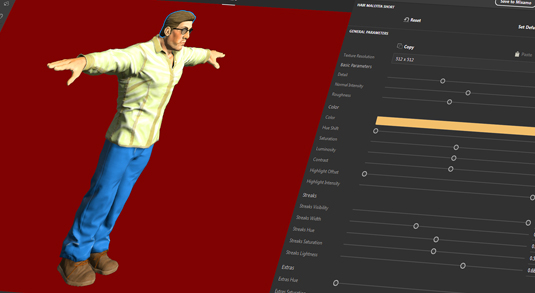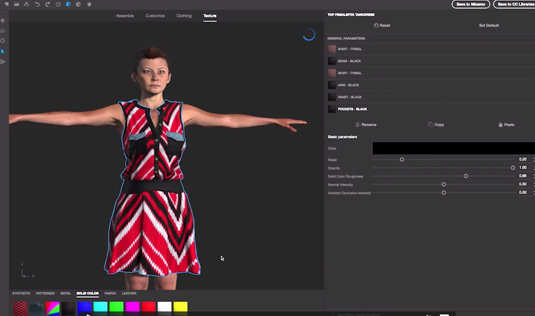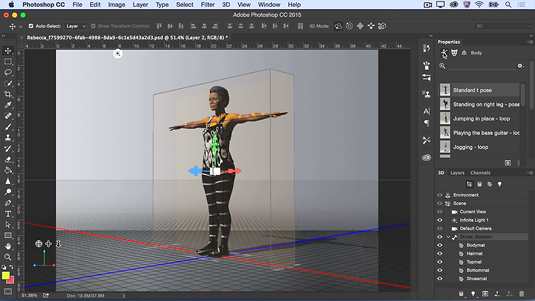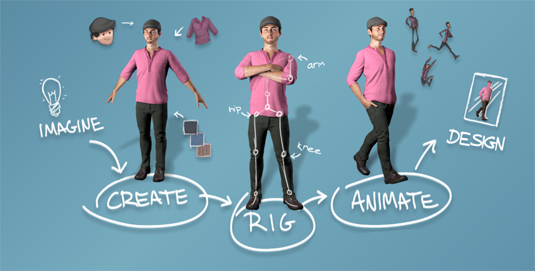Is Adobe Fuse a worthwhile addition to your design toolkit?
Adobe is taking on Poser with Fuse – Lance Evans investigates.
Daily design news, reviews, how-tos and more, as picked by the editors.
You are now subscribed
Your newsletter sign-up was successful
Want to add more newsletters?

Five times a week
CreativeBloq
Your daily dose of creative inspiration: unmissable art, design and tech news, reviews, expert commentary and buying advice.

Once a week
By Design
The design newsletter from Creative Bloq, bringing you the latest news and inspiration from the worlds of graphic design, branding, typography and more.

Once a week
State of the Art
Our digital art newsletter is your go-to source for the latest news, trends, and inspiration from the worlds of art, illustration, 3D modelling, game design, animation, and beyond.

Seasonal (around events)
Brand Impact Awards
Make an impression. Sign up to learn more about this prestigious award scheme, which celebrates the best of branding.
If 3D is the holy grail of graphics, then human models are the pinnacle of all 3D work. And this is the niche that Adobe's Fuse is looking to serve when it is added to the software giant's Creative Cloud suite. Oddly though, this narrow high-end niche has been dominated over the last 20 years by just one mid-priced program called Poser. Most of you will have heard of it, and it's hard to imagine anyone who has come into contact with 3D that hasn't spent at least a few minutes playing with it at one point or another.
We all know a Poser model when we see it. Its models, images and animations have been used in architectural renderings, infomercials, legal proceedings and medical videos. You've even seen them in some big-budget Hollywood movies as digital stunt doubles. Then of course, there's the seamier side of Poser: the use by adolescent and even adult men, who undress poor 'Victoria' model, putting her in poses that are best reserved for the Kama Sutra.
With Adobe's introduction of Fuse, now in pre-release, we have to ask where they see it fitting into both the market, and more so, where it fits in our digital tool kits. How does Fuse compare with the two versions of Poser currently being offered by its publisher, Smith Micro?
Alas, we won't really know the answer to some of that until they ship the final release. And to be fair, not really until they have had a couple of years to develop it a bit further. But in the meantime, we can certainly eek out a feeling for what's to come, and where it might best, or be bested by its direct competition, Poser.

The basic 'Poser' version retails for $199, and 'Poser Pro' which sells for a heftier $499. The prices of these reflect the 20 years of development and extensive list of features each offer. A comparison chart can be seen here. Both versions contain very large libraries of human (and humanoid) characters, clothing libraries that would choke your walk-in closet, plus extensive hair, props and scenery.
They also include high end abilities like physics simulations, a walk designer, lip-synching, and an impressive list of modification tools. The capabilities list reads like any of the high-end programs, but in fairness, their implementations in poser don't compare to those found in a 3ds Max or Maya. But that's okay, because Poser also allows you to import your Poser creations into a wide range of 3D applications for scene integration and final renderings.
By comparison to all of that, Fuse's pre-release feature sets are nowhere near as developed, as one might expect. You can see the basic workflow of it at Adobe's site here. Note that unlike Poser that defaults to placing a full body of your choosing, Fuse only places each body part, one by one. Unless you hold down the Shift key while clicking on any body part, which will tell Fuse you want it to place the entire body at once. This should be the default.
Daily design news, reviews, how-tos and more, as picked by the editors.

Adobe didn't actually start from scratch here. Fuse is actually part of a range of tools obtained with their purchase of a company called Mixamo. Based in San Francisco, Mixamo was created as an outgrowth of work done by its founders at Stanford University.
And Fuse is just one part of Mixamo's range of tools that include online automatic character rigging technology, an animation store that includes a large selection of pre-fab mocap animations, and real-time facial animation technology that is generated from video capture using a simple webcam.
A bit of this has been rolled into the new release of Photoshop, where you can now import a Fuse Model, and using PS's 3D tools, adjust, position, light and render the models. You can also bring up a library of poses and animations to apply to the models. I'm not yet sure if this library will be the complete Mixamo offering, or a subset. Though it seems logical some will be free and others for purchase.

And of course right there is a huge perk the Fuse workflow offers over the existing Poser workflow. The ability to port your work to Photoshop. For any still work, this is much better than porting to another 3D program as Poser does. And keep in mind that PS has basic animation tools and a timeline, so basic animation can still be done here. To see the Fuse workflow once inside Photoshop, take a look at this video at Adobe's site.

What really starts to get me excited though, is when I float my browser over to Mixamo's website. While we can tell it is in transition, we can still follow some links to find some interesting offerings. Which I'm hoping means these things will migrate into our Adobe workflow and toolsets some time soon.
Go to their site, while it still exists, and take a peek at the links under the 'Products' dropdown menu. You will see things like 'Fuse', 'Character', 'Decimator', 'Auto-Rigger', 'Face Plus' and more. As Adobe assimilates these technologies, I would expect this website to evaporate somewhere down the road. Hopefully, some of these ancillary technologies won't evaporate, and will find a home alongside Fuse. This is not a given, as Adobe, Apple and others have bought and trashed great technology before.
In any event, we are at an interesting pivot-point. Adobe's history with 3D has always been tenuous. They have always been one step forward, and three back. And other than a brief foray into a bezier-based 3D app years back, they have never had a 3D program. Despite Photoshop's evolution into 3D, Fuse is now Adobe's first. Let's see where both they, and the user base takes it. Jump in now while it's free and start playing!
Words: Lance Evans
Lance Evans is creative director of Graphlink Media.
Like this? Read these!
- The designer's guide to working from home
- How to build an app: try these great tutorials
- Free graphic design software available to you right now!

The Creative Bloq team is made up of a group of art and design enthusiasts, and has changed and evolved since Creative Bloq began back in 2012. The current website team consists of eight full-time members of staff: Editor Georgia Coggan, Deputy Editor Rosie Hilder, Ecommerce Editor Beren Neale, Senior News Editor Daniel Piper, Editor, Digital Art and 3D Ian Dean, Tech Reviews Editor Erlingur Einarsson, Ecommerce Writer Beth Nicholls and Staff Writer Natalie Fear, as well as a roster of freelancers from around the world. The ImagineFX magazine team also pitch in, ensuring that content from leading digital art publication ImagineFX is represented on Creative Bloq.
